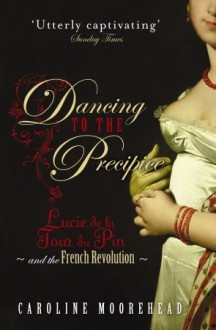
I read Moorehead’s Village of Secrets last year and liked it, so when I was looking for some good non-fiction recently, I decided to try another of her books. Dancing to the Precipice is also about French history,, but in this case it’s about Lucie de la Tour du Pin, an 18th and 19th century memoirist. Lucie was there for, or connected to, apparently everything that happened in France, or the UK, or the US during this period.
I mean–she and her husband escaped the Revolution (both of their fathers were executed during the Terror) and promptly ended up in the US living with General Philip Schuyler. Yes. That General Philip Schuyler. They knew the Hamiltons well during their stay in the US. Lucie was also a lady in waiting to Marie Antoinette and knew Wellington when they were young. They were in Brussels during Waterloo, and Lucie’s half sister lived with her family on both Elba and St. Helena during Napoleon’s exiles.
All of this connectedness gives us a personal view into these huge international events. Lucie’s memoir has apparently been a staple of scholarship for ages, but Moorehead fills in the gaps of the memoir with details from her letters and background from other characters. We see everything quite clearly from Lucie’s point of view, but we also are given the context. It makes for some interesting reading.
However, I do have to say that the treatment of racial, and to a certain extent class, issues is not good. Moorehead is British and may not grasp some of the problems with the representation of Indians in US culture. But the section when Lucie and family are in New York was particularly grating–as is the French print of Lucie interacting with a noble savage, reproduced for us. In general, I felt that Moorehead tended to repeat 18th century prejudices without the counterbalance of commentary. If she can point out when Lucie is being snobbish, she can also point out that the Hottentot Venus is not neutral or okay.
So, enjoyment of this book probably depends on the degree to which one can accept the fact that its subject was an 18th century French aristocrat–granted one with liberal, reform tendencies. I did find it a fascinating window into the time and place, while also remembering that the perspective was a limited one. If nothing else, Moorehead gives a sense of the women–both Lucie and others–who made up part of the landscape of that time and place; a vivid, complex, argumentative group, who certainly were not the prim dolls we tend to make of women from the past.
In short, while far from perfect, Dancing to the Precipice is also engaging and thoughtful, and I’m glad to have read it.
Book source: public library
Book information: 2009, HarperCollins; adult non-fiction

 Log in with Facebook
Log in with Facebook 






